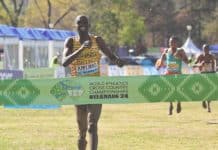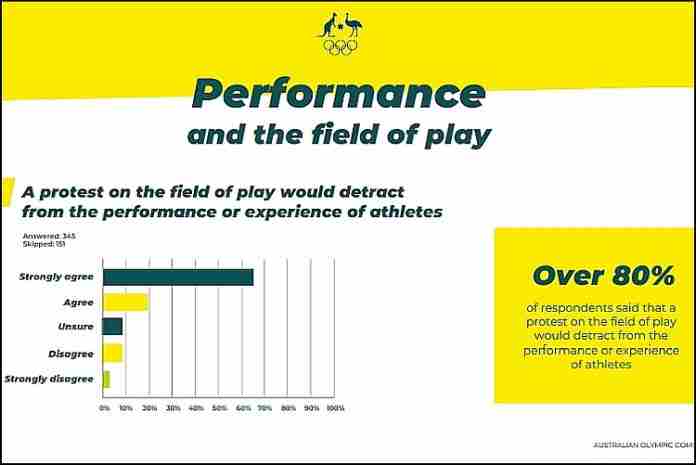(★ Friends: You are fantastic! Now 60 donations to cover our half-yearly server and support costs, and helping with the next bill, in December. If you would like to add your support, please donate here. Your enthusiasm is the reason this site continues. ★)
You don’t normally hear too much about National Olympic Committees on a day-to-day basis. But 2020 is the year that is anything but normal.
Going into this year, the main object of concern among athletes in western countries was about the ability to publicize their personal sponsors during the Olympic Games period, taking advantage of one of the few times they might have some public visibility due to the popularity of the Games vs. the usual profile of their sport or event. But Olympic Charter Rule 40 controls this exposure and the International Olympic Committee broadened its view to allow NOCs to determine the amount of visibility allowed.
This tussle got lost in the aftermath of the 25 May killing of George Floyd in Minneapolis, Minnesota, with loud voices calling for the deletion of Olympic Charter Rule 50.2, which states:
“No kind of demonstration or political, religious or racial propaganda is permitted in any Olympic sites, venues or other areas.”
A set of guidelines was issued in January by the Athletes’ Commission of the International Olympic Committee, prohibiting protests on the field of play, on the victory stand, during ceremonies and in the Olympic Village. But protests were welcomed on social media, within team meetings and in interactions with news media.
The IOC’s Executive Board asked its Athletes’ Commission to take another look at the issue and the Commission in turn has asked National Olympic Committees to submit their recommendations on how the rule should be amended, deleted, or replaced.
In June, the Global Athlete group, which purports to be an “international athlete-led movement that will inspire and lead positive change in world sport, and collectively address the balance of power between athletes and administrators,” issued its own call “to immediately abolish” Rule 50, saying “Athletes will no longer be silenced.”
Issue over, right?
Wrong.
Over the past few days, the “athlete voice” from two western countries – Australia and Ireland – declared that protests on the victory stand, a la Americans Tommie Smith and John Carlos in 1968 and Vince Matthews and Wayne Collett in 1972, are not favored venues for demonstrations.
● Australia: 80+ percent against podium demonstrations
The Australian Olympic Committee released its survey results of 496 current and prior Olympians and 2020 Olympic hopefuls last Friday (14th). In response to the question of whether “A protest on the field of play would detract from the performance or experience of athletes,” only 348 answered the question.
But about 85% indicated that such protests would detract, with about 65% saying they “strongly agree” and 20% stating “Agree.” Roughly 9% said they were unsure.
As to where protests should NOT take place, the replies emphasized the Olympic Village, in the field of play, on the podium or just “at sporting events” or at the Olympic Games.
The survey showed almost 41% said the Games should not be a place for protest at all, and another 39% said OK “under some circumstances.” As to what those circumstances included, only 122 answered the question, with the responses favoring (1) NOT on the field if play, (2) NOT on the podium or at the Opening or Closing Ceremonies, (3) perhaps through “physical tokens” such as an armband or ribbon on the uniform, (4) a designated area in the Olympic Village, (5) in post-race interviews, news conferences or on social media. One highlighted comment:
“I believe post-competition interviews, social media, press conferences are an excellent opportunity to express such views, where the focus is solely on the individual. Thus, medal ceremonies and other group or engagements where other athletes are involved are not good times to express views as this can detract from the other individuals sharing that moment.”
There was also a desire to understand the Rule 50 guidelines better, with more specifics about what is allowed, what is not and possible penalties.
● Ireland: Only 19% of those polled answered the questionnaire
The Athletes’ Commission of the Olympic Federation of Ireland sent a survey to an undisclosed number of Irish athletes, asking their opinion about Rule 50. The full survey details were not provided, but a news release on the results included:
“While the response rate of 19% could represent a limited depth with regards Rule 50 amongst many Irish athletes the majority of those who did respond (62%) indicated that some form of protest should be allowed with a strong preference for forms of protest that would not involve or impact the podium. This view was further re-enforced as 67% of respondents indicated they would not be in favour of unrestricted protest.”
The next step:
“Tokyo Olympic hopefuls and Olympians are now invited to take part in an open forum to discuss how to define a ‘considerate’ protest, which will take place online on the 3rd September. Following this the OFI Athletes’ Commission will establish a more concrete position from Team Ireland to present to the IOC.”
While the sentiment for an appropriate protest forum is similar to that heard from Australia, the stunning statistic is that only 19% of those surveyed responded. This is a metric to be watched closely in survey results from other countries.
Members of the IOC’s Athletes’ Commission have voiced interest in collecting survey results by the end of September so that a recommendation can be forwarded for possible action to the IOC’s Executive Board in advance of its 7 October meeting. There are many more voices to be heard before then, but the Australian and Irish surveys are hardly in line with what have been the loudest voices so far.
¶
Loud voices have also been calling for the destruction, reconstruction or re-arrangement of the U.S. Olympic & Paralympic Committee, but a one-year review of the progress since the issuance of the Borders Commission report last year indicates good progress.
The review, authored by group chair Lisa Borders – the former President of the WNBA – with counsel from Commission member (and 1984 Olympian) Michael Lenard and counsel Davis Butler, focused on whether the USOPC has acted on the 34 “Implementation Steps” listed in its July 2019 report.
The USOPC got a good grade, with a “full implementation” grade on 34 of the 39 items (87.2%) listed, with “in progress” marks on the other five. Not all of those items graded “full” have been implemented completely, some due to the impact of the coronavirus pandemic; ten of the items included a note that the “Expectation is that USOPC will deliver as recommended.”
The review importantly noted that significant structural changes within the USOPC’s operating regulations had been made, but that:
“[T]he ultimate success of changing the culture cannot be fully gauged at this time.
“Second, in adopting most of those new or revised documents, the USOPC was inclusive in a manner that it had not been for over twenty years. The input of, and importantly agreement among, athletes (via the USOPC Athletes Advisory Council and US Olympic and Paralympic Alumni) and the sports (via the National Governing Bodies Council) was actively sought, and their representatives served and will continue to serve on important working groups and committees of the USOPC.”
The USOPC scored 13 full-implementations of 15 in the area of prioritizing athletes; the review also found:
● “Historical [NGB] funding based upon and tied to only the winning of medals has been expanded to include a broader and more holistic look at NGB performance”
● “The new model of collaborative efforts with athletes and NGBs in the development of the
criteria is significant”
● “Significant and commendable efforts have been made by the USOPC to transform its culture into an ‘athlete-centric culture’ providing protection of, service to and advancement of athletes as evidenced by revised Mission statement and other policy documents are commendable”
The review was favorable toward some of the proposed changes in the Ted Stevens Olympic and Amateur Sports Act, but did not mention the possible clashes with the Olympic Charter in the legislation since this was outside the purview of the Borders Commission scope of inquiry.
A good review to be sure, but one that will have to be followed up again to see if the momentum is maintained once competitions – and Olympic Games – resume.
Rich Perelman
Editor
You can receive our exclusive TSX Report by e-mail by clicking here. You can also refer a friend by clicking here.




















